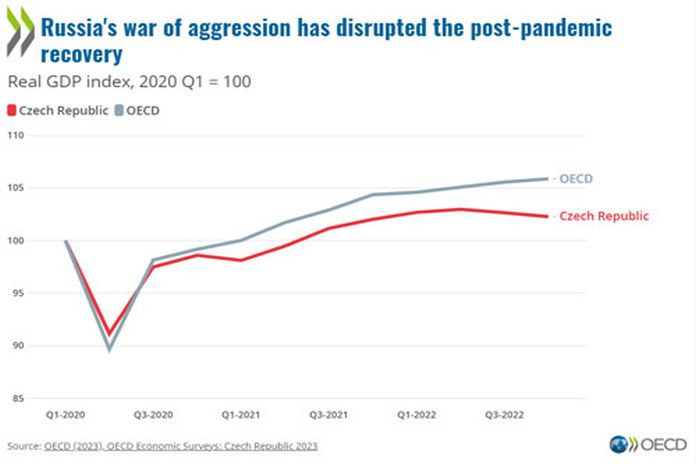PARIS, France – Russia’s war of aggression against Ukraine has disrupted the Czech Republic’s post-pandemic recovery, contributed to a sharp spike in inflation, and has held back the country’s convergence towards OECD income levels, according to a new OECD report.
The latest OECD Economic Survey of the Czech Republic commends the government’s generosity in welcoming some 500,000 Ukrainian refugees, close to 5 percent of its population, and providing them with basic services and education. It says the immediate economic priority should be to bring down inflation by maintaining a tight macroeconomic policy stance, while preserving financial stability. For the longer term, pension and tax reforms could strengthen public finances in the face of looming costs from population ageing, while labour and education reforms would boost growth and incomes.
“While we expect growth to recover next year and inflation to subside, the Czech Republic needs to pursue structural reforms to drive strong and sustainable growth,” OECD secretary-general Mathias Cormann said, presenting the Survey in Prague alongside prime minister Petr Fiala.
“Advancing pension and tax reforms would strengthen public finances in the face of rising spending needs. Bringing more skilled people into the labour market while boosting female workforce participation would help address the chronic labour and skills shortages that are weighing on growth.”
Among its recommendations to support long-term growth, the Survey says raising skilled labour participation will be key to addressing the workforce shortages that are posing a major obstacle to growth. It recommends investing in education and skills, lengthening working lives and broadening labour participation, for example by providing incentives for mothers to take up jobs. That could include better provision of childcare and adjustments to parental leave and benefits. Labour migration policy could also be better geared to attract skilled foreign workers.
Steep rises in energy and commodity prices and disruptions in gas and oil imports from Russia have fuelled a cost-of-living crisis with entrenched inflation that has dampened domestic demand. Weak global growth, supply chain constraints and high uncertainty have also weighed on activity. The Survey sees GDP growth picking up to 2.4 percent in 2024, however, amid an easing in global supply disruptions and improved prospects among trading partners.
The economic survey suggests that the current energy crisis can be seen as an opportunity for the Czech Republic to strengthen its resolve on decarbonising its economy, which still relies heavily on coal for electricity production and heat generation. More public funding and an improved business climate could help to increase the investment needed to expand renewable energy sources and improve energy efficiency, particularly in housing. More stringent environmental policies would also help to bring down greenhouse gas emissions.
The path towards a net zero economy will see some jobs lost as new ones are created. It will be important to put in place policies that ensure a fair green transition, including retraining and other active labour market policies to help displaced workers find new jobs quickly.
Successfully managing these economic and structural challenges, ensuring optimal public services, and reinforcing trust in government will require a more modern and effective public administration, according to the latest OECD Public Governance Review of the Czech Republic, launched in parallel with the Survey. The Review recommends ensuring the Czech Public Administration Reform Strategy 2030 has sufficient leadership, support and resources for effective implementation, and enhancing the office of the government’s capacity to ensure the alignment and delivery of strategic objectives, including through support for more evidence-informed policy-making.
The review says that more could also be done to strengthen the attractiveness of the public service by recruiting talent through streamlined recruitment processes. The national government should also look to encourage greater inter-municipal co-operation and planning, in particular through incentives, including financial ones, and new collaboration mechanisms.





